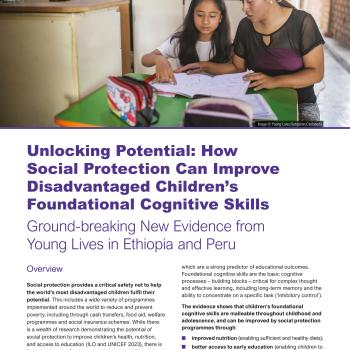
In this Policy Brief the authors present ground-breaking new evidence from Young Lives' longitudinal data showing how social protection can have a positive impact on children’s foundational cognitive skills, which are a strong predictor of educational outcomes.
The evidence shows that children’s foundational cognitive skills are malleable throughout childhood and adolescence. Social protection programmes are not directly designed to improve children's skills, but the evidence shows they can have this effect and as such they offer huge potential to help address inequalities in educational outcomes. The Brief examines how two different social protection programmes, in two very different country contexts – the PSNP in Ethiopia and JUNTOS programme in Peru – can mitigate the negative effects of early poverty and climate shocks to improve disadvantaged children’s foundational cognitive skills.
The authors argue that a broad approach is required to improve children’s basic skills and address inequalities in educational outcomes, including a better understanding of how poverty and climate shocks have an impact on foundational cognitive skills and offer a series of specific recommendations for policy makers.
For more Young Lives research and policy recommendations on education and skills visit our project page here. For updates on Young Lives work, follow us on Twitter @yloxford, LinkedIn and Facebook.

In this Policy Brief the authors present ground-breaking new evidence from Young Lives' longitudinal data showing how social protection can have a positive impact on children’s foundational cognitive skills, which are a strong predictor of educational outcomes.
The evidence shows that children’s foundational cognitive skills are malleable throughout childhood and adolescence. Social protection programmes are not directly designed to improve children's skills, but the evidence shows they can have this effect and as such they offer huge potential to help address inequalities in educational outcomes. The Brief examines how two different social protection programmes, in two very different country contexts – the PSNP in Ethiopia and JUNTOS programme in Peru – can mitigate the negative effects of early poverty and climate shocks to improve disadvantaged children’s foundational cognitive skills.
The authors argue that a broad approach is required to improve children’s basic skills and address inequalities in educational outcomes, including a better understanding of how poverty and climate shocks have an impact on foundational cognitive skills and offer a series of specific recommendations for policy makers.
For more Young Lives research and policy recommendations on education and skills visit our project page here. For updates on Young Lives work, follow us on Twitter @yloxford, LinkedIn and Facebook.

